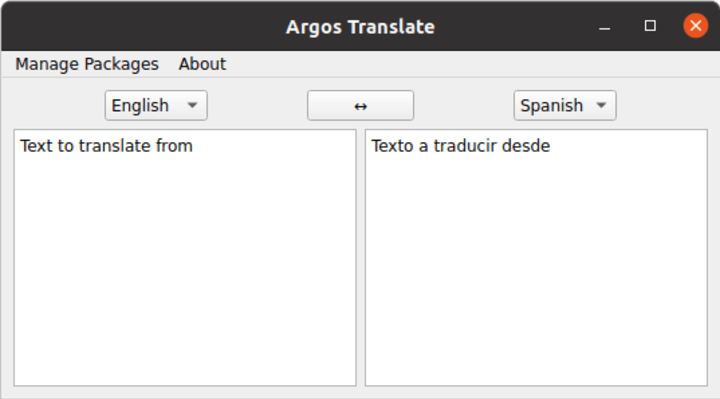Productivity corner: offline translation
by Igor Ljubuncic on 27 November 2020
Language translation. Easily said, not easily done. Human languages have evolved over the past 30,000 years, tightly coupled to culture and collective memories of peoples, which is why, even today, we often struggle with fine nuances of meaning and context, especially when they need to be expressed in another language. But then, if we struggle, what chance do machines have?
The machines have the power of computing on their side. On the Internet, instantaneous translations are a popular thing – you feed words into a form, the words are processed in the cloud, and words in another language come back, more or less accurate. There are practical limitations and issues with this method, including privacy concerns. The question is, is it possible to have offline translation capability, which allows the user to perform high-quality language processing, without the potential online use implications?
Argos Translate
This is an offline, open-source Neural Machine Translation (NMT) engine and application, using OpenNMT, SentencePiece and Stanza technologies to piece together meaningful translations. Available as a snap, Argos Translate is easy and simple to install and use. By default, a set of six base languages is available with the application – Arabic, Chinese, English, French, Russian, and Spanish. Users can optionally manage and download additional language sets through the Argos Translate GUI.


Does it work?
We have already partially covered various translation tools and engines in our series of articles on productivity snaps, like for instance the Yandex engine in ONLYOFFICE Desktop Editors, and there are quite a few others worth exploring and testing. The results can be bucketed into two separate groups – results that are focused primarily on English as the main base language, and results from engines that are designed for bilingual users whose primary or native language is not English. Quite often, the fidelity of translation for non-English languages is less precise, also due to technical complexities and grammar of languages involved.
We decided to put Argos to a series of tests, and initially, we used a somewhat uncanny snippet of text to see how well it works. On its own, Argos Translate does the job reasonably well, and with a small amount of data, the translations are just as quick as you’d get with an online engine. Equally importantly, the application respects the fine nuances of linguistic differences – for instance, the use of exclamation mark(s) in Spanish.

Indeed, using Spanish and Russian as target languages, Argos did a reasonable accurate translation. Not perfect, but then, not far behind the level of accuracy you get from online tools. Sentence structure is critical, though. For instance, the Russian translation was significantly different (the actual meaning) when the second-to-last and last lines were put together into a single sentence. However, there were still some (small) issues, as English has no word genders, whereas Russian does, and so the translation did not accurately predict the subject and object of the paragraph – to be fair, it is an archaically, artistically styled paragraph, which actually emphasizes the quality of the translation.


Reserve translation is another important test – translating back the translation, to see whether the original meaning is retained. In both cases, the results were good enough to piece together a reasonable level of intended message. During the testing, the system utilization was low, and Argos Translate was fast, as the pretrained models and the base languages already contain the necessary computation to help generate translations on the fly.

With a somewhat longer piece of text, Argos Translate did take a few seconds to process the information. Similarly, the line structure is critical. The results differ if sentences are broken over multiple lines to a single unbroken segment.


There’s still work to be done – some words were flat-out wrong, but the tool did a reasonable task, and the offline capability opens up a range of possibilities for Linux users. Argos Translate is available as a snap, so you can grab it and test it right away.
Summary
While this may sound like a tongue-in-cheek statement, we love exploring and touring the Snap Store ourselves, looking for interesting, valuable and practical software for day-to-day needs. With thousands of applications available, there’s always something new to discover, even for the curators and owners of the store. The world of offline translation is one of the many, often overlooked aspects of modern computer usage.
If you have any comments or suggestions, please join our forum and let us know. We frequently feature applications in the Snap Store, and we promote content in our social media channels, focusing entirely on curiosity, novelty and practical value. We appreciate any feedback you may have, and feel free to tell us and other snap users about the various applications and use cases worth considering.
Photo by Romain Vignes on Unsplash.
